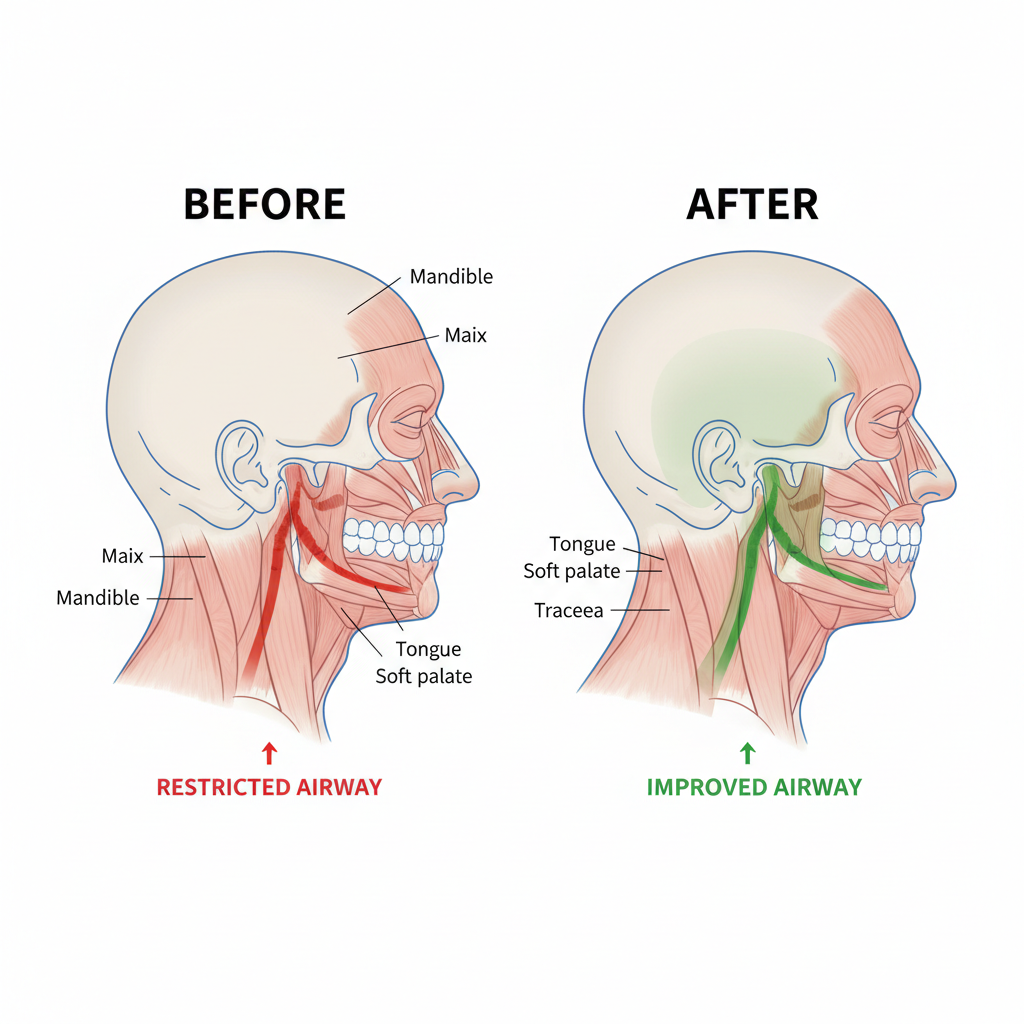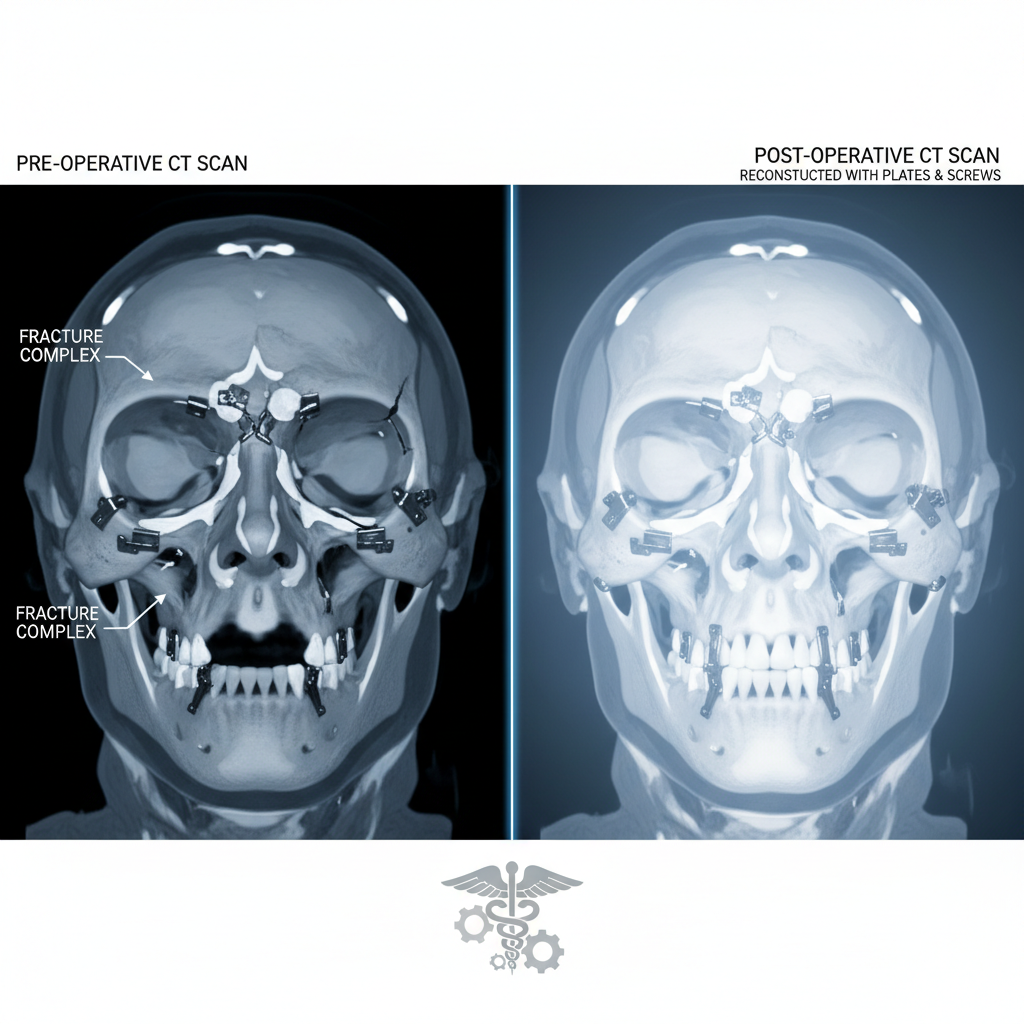Jaw problems often go unnoticed but can significantly impact daily life. Orthognathic (jaw) surgery addresses functional issues like chewing, breathing, and speaking, as well as aesthetic concerns. Here are key signs you might need jaw surgery:
- Chronic Jaw Pain or TMJ Issues: Persistent pain, headaches, or ear discomfort could indicate jaw misalignment.
- Difficulty Chewing or Swallowing: Struggles with eating may stem from bite issues.
- Sleep Apnea or Snoring: Jaw structure can obstruct airways, causing poor sleep and fatigue.
- Facial Imbalances: Significant asymmetry may signal functional problems.
- Frequent Jaw Locking or Clicking: Irregular jaw movement can worsen over time.
- Dental Wear and Tear: Misalignment leads to uneven pressure, damaging teeth.
Why It Matters: Ignoring these symptoms can worsen the issues, leading to more complex treatments later.
Next Steps:
- Consult a dentist or orthodontist.
- Get a comprehensive jaw assessment.
- Explore surgical and non-surgical options.
Jaw surgery can be life-changing, improving function, appearance, and overall health. Don’t ignore the signs—seek professional advice to find relief!
Table of Contents
Sometimes health issues that seem like minor annoyances can be clues to something more significant. Jaw problems, for instance, often go unnoticed because their symptoms overlap with other conditions or are shrugged off as “normal.” Yet, for many people, these signs could indicate that jaw surgery (also known as orthognathic surgery) is necessary to correct underlying problems. This post will break down common symptoms that may point to the need for jaw surgery, explain how these problems affect your daily life, and guide you on what steps to take next.
What Problems Can Jaw Surgery Address?
Orthognathic surgery isn’t just about aesthetics—though it may correct issues like facial asymmetry—it’s primarily aimed at improving function. Misaligned jaws can cause various issues with chewing, breathing, speaking, and overall oral health. But because these changes tend to develop gradually over years, many people adapt to symptoms without realizing that surgery could provide a long-term solution.
Below, we’ll explore key signs that could indicate the need for jaw surgery.
1. Chronic Jaw Pain or TMJ Issues
Jaw pain that persists isn’t something to ignore. Many people experience this as part of temporomandibular joint (TMJ) disorders, which may feel like tightness, popping sounds, or sharp discomfort when opening your mouth. While stress or teeth clenching can contribute to TMJ pain, the root cause might also lie in a jaw misalignment.
Impact on Daily Life:
- Difficulty biting or chewing certain foods because opening your mouth becomes painful.
- Chronic headaches or ear pain due to strain in the jaw muscles.
- Worsening pain during the day, especially after talking, eating, or yawning.
While non-invasive treatments like splints or physical therapy may offer short-term relief, orthognathic surgery can correct structural issues, providing lasting improvement.
2. Difficulty Chewing or Swallowing
Do you struggle to bite, chew, or swallow food properly? While minor issues could stem from dental problems, ongoing difficulty might point to an issue with your jaw’s alignment.
For example, an overbite might prevent your teeth from meeting properly, making it hard to cut through certain foods. Meanwhile, people with underbites or open bites may find it difficult to chew altogether.
Impact on Daily Life:
- Avoiding certain foods because they’re difficult or painful to eat.
- Increased digestive issues from not properly chewing food.
- Feeling embarrassed to eat in front of others because of chewing struggles.
If these problems are tied to your jaw structure, surgery could align your bite, allowing you to chew and swallow comfortably again.
3. Sleep Apnea or Snoring
Sleep apnea, a condition where breathing is repeatedly interrupted during sleep, is often caused by airway obstructions. For some, the culprit is jaw structure. If your lower jaw is set too far back, it may block your airway when you’re lying down.
People with sleep apnea don’t just snore loudly—they may wake up gasping for air, experience poor-quality sleep, or feel exhausted during the day, even after going to bed early.
Impact on Daily Life:
- Chronic fatigue that affects focus and productivity.
- Increased risk of other health issues like high blood pressure or heart disease.
- Strained relationships if your snoring disrupts a partner’s sleep.
Orthognathic surgery can reposition the jaw to open the airway, providing relief from sleep apnea and improving your quality of life.
4. Facial Imbalances and Asymmetry
Have you noticed that one side of your jaw looks different from the other? While some asymmetry is common and harmless, significant irregularities could signal an underlying jaw misalignment. Issues like a protruding lower jaw, a receding chin, or a crossbite don’t just change how you look—they might affect how your jaw functions.
Impact on Daily Life:
- Feeling self-conscious in social interactions or photos.
- Strain in the jaw muscles as your body compensates for the imbalance.
- Difficulty fitting a dental appliance (like mouthguards) properly.
If you notice these visual signs along with functional challenges, it’s worth consulting a specialist to explore potential solutions, including surgery.
5. Frequent Jaw Locking or Clicking
If your jaw tends to lock open or closed—or produces a clicking or popping sound when you move it—that motion irregularity might be signaling a deeper problem. Over time, these mechanical issues could worsen and lead to more severe discomfort, uneven wear on your teeth, and even difficulty speaking or chewing.
Impact on Daily Life:
- Constant worry that your jaw will “lock” at the worst possible moment.
- Avoiding wide mouth movements (like laughing, yawning, or singing).
- Loss of confidence from fearing sudden clicking sounds when talking.
Jaw surgery can help realign the structures responsible for smooth movement, eliminating these disruptions.
6. Dental Wear and Tear
Your teeth shouldn’t feel like they’re working overtime, but jaw misalignment can make them pick up the slack. Over time, this uneven pressure leads to abnormal wear patterns, chipped teeth, or increased sensitivity.
Impact on Daily Life:
- Spending more on dental procedures to fix recurring damage.
- Feeling uncomfortable while brushing or eating hot/cold foods.
- Accelerated risk of developing issues like cavities or gum disease.
Correcting the jaw’s alignment relieves undue stress on your teeth, allowing them to perform naturally and efficiently.
Why Ignoring These Symptoms Can Be Harmful
Many people dismiss these problems, thinking they’ll “get used to them” or find alternative solutions like pain relievers or dental braces. However, underlying jaw issues generally worsen over time, increasing the need for more complex interventions later on.
Early diagnosis is the key to preserving your oral health, stopping unnecessary discomfort, and improving your quality of life.
What to Do Next
If you recognize one—or more—of these symptoms in your life, consider taking the following steps:
- Consult a Dentist or Orthodontist: Start by discussing your concerns with a dental professional. They may refer you to an oral and maxillofacial surgeon for further evaluation.
- Get a Comprehensive Jaw Assessment: This usually involves X-rays, 3D scans, and a physical examination to identify alignment or structural issues.
- Explore All Options: If surgery is recommended, ask about the procedure, recovery time, and long-term outcomes. Discuss non-surgical alternatives to understand what will work best for your situation.
Remember, you don’t have to live with discomfort or frustration. Jaw surgery might sound intimidating, but for many, it’s a life-changing procedure that restores function, improves appearance, and enhances health.
Take the First Step
Recognizing the signs of a jaw issue is often the hardest step, especially when the symptoms feel like “just part of life.” But by paying attention to these warning signs now, you position yourself to seek the right care and improve your well-being. Don’t hesitate to reach out to a professional to discuss your concerns—you might be closer to relief than you think!





